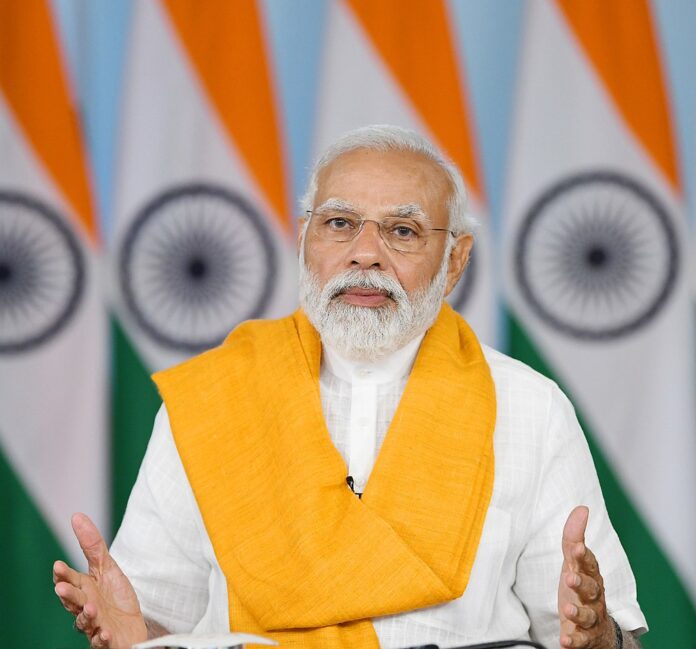Narendra Modi secures backing from key allies Chandrababu Naidu and Nitish Kumar as the BJP-led NDA prepares for government formation
In a pivotal moment for Indian politics, Prime Minister Narendra Modi is poised to embark on his third consecutive term as the leader of the world’s largest democracy. Following a resounding victory in the 2024 Lok Sabha elections, Modi’s Bharatiya Janata Party (BJP)-led National Democratic Alliance (NDA) clinched 293 seats, surpassing the majority mark of 272. With the stage set for government formation, Modi received unanimous support from NDA leaders, who hailed his leadership and the nation’s progress under his stewardship.
At a meeting held earlier today at Modi’s residence, senior figures from the BJP and its coalition partners convened to review the election outcome and discuss the path ahead. Among them were Telugu Desam Party (TDP) chief Chandrababu Naidu and Janata Dal (United) leader Nitish Kumar, whose collective 28 Lok Sabha seats hold significant sway in maintaining the coalition’s majority. Both Naidu and Kumar’s parties secured victories in their respective states, with the TDP winning 16 seats in Andhra Pradesh and the JDU securing 12 seats in Bihar.
Recognizing the pivotal role played by Naidu and Kumar, Modi expressed gratitude to the leaders during his victory address at the BJP headquarters in Delhi. As speculation loomed over potential overtures from the opposition, the BJP took preemptive measures by obtaining written assurances of support from the TDP and JDU bosses. This strategic move aims to fortify the coalition’s stability amidst the INDIA bloc’s endeavors to explore government formation options.
Despite the opposition’s efforts to court Naidu and Kumar, their intentions remain undisclosed. However, sources suggest that discussions involving demands such as special status for their states and ministerial positions are underway. The recent election witnessed a notable challenge from the INDIA bloc, comprising parties like the Congress, which fell short of the majority mark with 232 seats.
Earlier today, Modi tendered his resignation to President Droupadi Murmu, signalling the dissolution of the incumbent government ahead of the scheduled oath-taking ceremony. Despite queries regarding the BJP’s electoral performance, Modi reaffirmed the party’s commitment to governance and the continuity of progress.
As the nation anticipates the formation of the new government, Modi’s impending inauguration heralds a new chapter in Indian politics. With his third term on the horizon, Modi’s leadership is poised to navigate the complexities of coalition governance and shape the trajectory of the nation’s future.
Analysis:
Political Impact: The resounding victory of the BJP-led NDA and Narendra Modi’s third consecutive term as Prime Minister carry significant political ramifications. The consolidation of power within the ruling coalition solidifies its position in national politics, enabling Modi to pursue his agenda with greater confidence. Furthermore, the support garnered from key allies such as Chandrababu Naidu and Nitish Kumar underscores the cohesion within the NDA and its ability to maintain a stable government despite challenges from the opposition.
Social Reflection: The success of the BJP-led NDA in the 2024 elections reflects broader societal trends and sentiments. Modi’s continued popularity among voters signals a resonance with his policies and leadership style. Additionally, the participation of regional parties like the TDP and JDU highlights the diversity of Indian politics and the importance of coalition-building in addressing regional aspirations within the broader national framework.
Psychological Aspect: Modi’s third term as Prime Minister evokes varied psychological responses among different segments of the population. For supporters, it instils a sense of continuity and confidence in the government’s ability to deliver on its promises. Conversely, critics may harbour concerns about the concentration of power and the potential implications for democratic principles. The psychological impact of Modi’s leadership style and governance approach continues to shape public perceptions and attitudes towards the political landscape.
Sociological Angle: The formation of the new government under Modi’s leadership reflects the sociopolitical dynamics prevalent in Indian society. The coalition’s ability to attract support from diverse regional parties underscores the importance of regional identities and interests in shaping electoral outcomes. Moreover, Modi’s emphasis on issues such as development, national security, and cultural nationalism resonates with certain sociological segments, contributing to his electoral success
Fashion Culture: While the news event primarily revolves around political developments, it may indirectly influence fashion culture through the symbolic representation of leaders and their attire during inauguration ceremonies and public appearances. The fashion choices of political figures, including Modi and other dignitaries, may attract media attention and set trends, albeit to a lesser extent compared to the broader political implications of the event.
